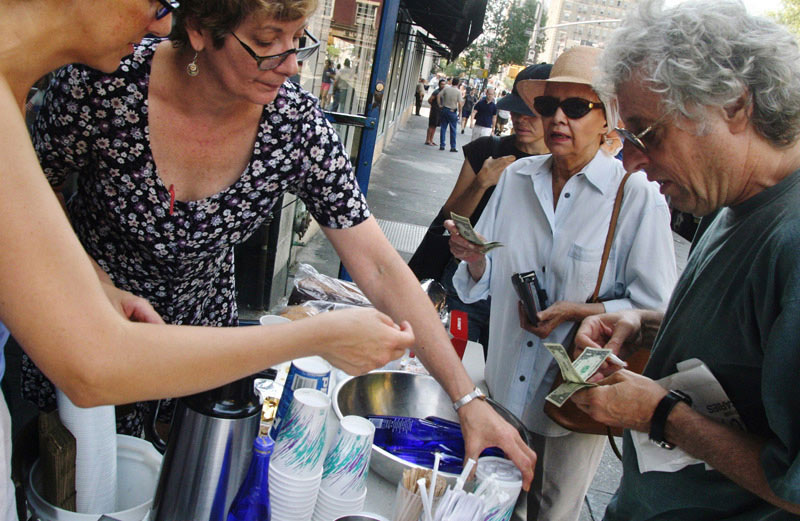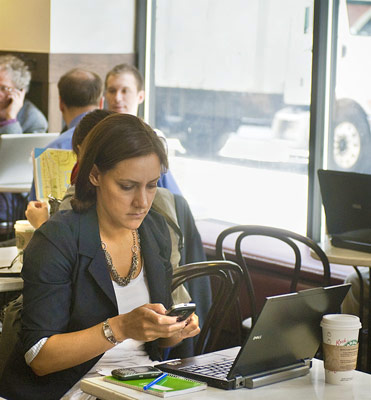< Introducing New York City
Useful Information

A 24-hour pharmacy in New York City
As one of the world’s major cities, New York has everything a traveler might need in the way of health facilities, and it offers all modern conveniences, including Wi-Fi, cell-phone connections, and ATMs. Visitors from other countries should be aware, however, that travel insurance is a wise investment. Also be aware that even though the city is now among the safest in the US, a few common-sense precautions are still in order.
Insurance
The high cost of medical care for non-residents in the US, and the difficulties faced in the event of air travel delays or lost luggage, mean that travel insurance is essential. It is best to buy valid coverage before you travel – your insurance company or travel agent can help you with this and should be able to recommend a suitable policy for your trip. The most important features to look for in an insurance policy are emergency medical and dental care, trip cancellation coverage, and cover for loss of baggage and travel documents. Transportation back home in case of an emergency is another option to consider. If you have coverage for loss of personal property at home, check to see whether it is valid when you travel abroad.
Health
Be sure to pack any prescription medications in your hand baggage and keep medications in their original containers with pharmacy labels so that they will pass easily through airport security. Notify security officials about any special items, such as supplies for diabetics. Unused syringes will be allowed when accompanied by insulin or other injectable prescription medication. Bring medicines for headache, allergies, or stomach upset, as well as sunscreen and hats.
If you need medical assistance while in New York, hotels can usually recommend a doctor, or you can use a service such as New York Doctor on Call or Housecall MD NY. Be prepared for hefty fees, and note that Housecall MD NY doctors only accept credit cards. Doctor on Call accepts both cash and credit cards.
Medical emergencies
The locations of hospital emergency rooms can be found in the yellow pages of the NY telephone book. The main Midtown hospitals are NYU, Beth Israel, and Roosevelt Hospital. On the Upper East Side are Mount Sinai, Lenox Hill, and New York-Presbyterian/Weill Cornell Medical Center. Pharmacy locations are listed by neighborhood on the map pages in this guide. If an ambulance is needed, dial 911.
Beth Israel
First Ave at 16th St, 10003; 2124202000
Lenox Hill
100 East 77th St near Lexington Ave, 10075; 2124342000
Mount Sinai
1190 Fifth Ave at 100th St, 10029; 2122416500
NewYork-Presbyterian/Weill Cornell Medical Center
525 East 68th St at York Ave, 10065; 2127465454
NYU
550 First Ave at 31st St, 10016; 2122637300
Roosevelt Hospital
1000 Tenth Ave at 59th St, 10019; 2125234000
Food allergies
Wheat, milk, and butter are staples in American cooking, so be careful if you have special dietary needs. Some restaurants can make vegetarian and gluten-free dishes. If a family member has a nut allergy, do not forget to mention it in advance and keep emergency medication to hand.

If buying refreshments from a street vendor in the city, be careful if you have any food allergies
Personal safety
Although New York has become one of America’s safest cities, it pays to be alert, especially to pickpockets. Keep your wallet safe in an inside pocket, never in a back pocket. If you are carrying a child, use a cross-body bag; if not, carry your bag in the crook of your elbow, not slung over your shoulder.
Deposit passports in the hotel safe and keep one credit card and a little cash in the safe as well. Laptops can also go into safes. If in doubt about whether to visit a particular neighborhood at night, check with the hotel concierge or clerk before venturing out. If handing luggage over to hotel staff, be sure to get a receipt for it. While out and about, refrain from wearing flashy jewelry or carrying expensive gadgets that might attract muggers.
Call 911 to reach the police or to summon help if you are hurt. If valuables are lost or stolen, get a copy of the police report for your insurance claim at home.
Lost and found
Grand Central Terminal and Penn Station have lost-and-found rooms. If you leave property on a bus, subway, or taxi, call 311 to report the loss to the taxi commission or the transit authority.
Lost and Found on Public Transport
311
Police, Ambulance, Fire
911
Money
For changing foreign currency into US dollars, bureaus such as Travelex can be found at every city airport as well as in Midtown. Most bank ATMs are part of the worldwide Plus or Cirrus network. ATMs usually give the best exchange rates. Bank machines and almost all businesses and restaurants accept popular credit cards such as MasterCard, Visa, and American Express, although getting cash with a credit card means paying interest fees. To guard against crime, use an ATM inside the bank, rather than machines accessed from the street.
Currency
The basic unit is the dollar, which equals 100 cents. Coins come in 1 cent (penny), 5 cent (nickel), 10 cent (dime), and 25 cent (quarter) denominations; each is a different size and thus easy to tell apart. There is a $1 coin, but it is rarely used. The most common bills are $1, $5, $10, and $20, although $50, $100, and larger denominations exist.
Credit cards and traveler’s checks
Major credit and debit cards are widely accepted throughout the US. It is best to use a credit card for expensive purchases, so that you have recourse in case of a problem and also to avoid carrying large sums of cash. Traveler’s checks are slowly being replaced by prepaid reloadable travel cards. You pay for these in advance in a denomination of your choice, then draw on the funds when you use the card. There is a fee for this service. Travel cards are issued by major card companies such as Visa or MasterCard and are as easily used as any other credit card. They are protected by use of a PIN and/or signature.
Travelex
1271 Broadway at 32nd St,
10001;
21267943651578 Broadway at 47th St,
10036;
2122656063;
www.travelex.com
Opening hours
Business hours are usually 9am–5pm. Almost all shops in the city open at 10am; smaller shops may close at 6 or 7pm, but department stores stay open till 8:30 or 9:30pm. However, Sunday opening hours are generally from 11am to 6 or 7pm. Banks are generally open 8am–3pm on weekdays, but many stay open later. Saturday hours are usually 9am–3pm.
Visitor information
NYC & Company, the city’s official tourist office, has four main visitor centers, and a fifth is operated by the Times Square Alliance.
Communications
Dial 1 before making any phone call in New York, even a local one. For example, to make a call within New York, dial 1-212 plus the number. Dial 0 to reach an operator if assistance is needed. To obtain a phone number, dial 411 – but note that there is a fee for this service. Toll-free calls are prefixed by 800, 866, 877, or 888, and you must still begin by dialing 1. To call an overseas number, dial 011, plus the country code, city area code, and number.
Cell phones and internet
Most modern phones are compatible with US services, although you may incur roaming charges, which can be quite high. If your present phone is incompatible with the US system, you may still be able to use it by changing the SIM card. Check with your service provider at home before you leave. It is possible to rent phones from firms such as Jojotalk. You can also save money by buying one of the prepaid cards available at most newsstands; the per-minute rate with these cards is less than that charged by most service providers. Card rates vary, so shop around a bit.
Most hotels offer Internet access and/or Wi-Fi connections, some free, others for a fee. Ask before you book as fees can be as high as $10 or more per day. Free Wi-Fi connections are available at all city libraries, Barnes & Noble and Borders bookstores, Starbucks, McDonald’s, Bryant Park, Battery Park, the concourse at Grand Central Terminal, and on Broadway near Times Square. Google has also just announced plans to provide the entire neighborhood of Chelsea with free Wi-Fi.

Free Wi-Fi access is often available at coffee shops in the city
Postal service
Many hotels sell stamps, and will mail your cards and postcards. Otherwise, you can head for a Midtown post office. The Main post office is open until 10pm.
Main post office
421 Eighth Ave at 33rd St, 10001; 2123303296
Media
The New York Times
is the major daily newspaper in the city, and covers international as well as local news. The newspaper’s Friday edition has extensive entertainment listings, including choices for families. The weekly Time Out New York magazine gives full coverage of what is happening in the city. Village Voice, a weekly alternative newspaper, offers entertainment and news geared to young adults. The three major TV networks are CBS, NBC, and ABC. The two main cable news outlets are CNN and Fox. Kids will enjoy Nickelodeon, Disney, and the Cartoon Network.
Disabled facilities
All city buses are accessible, as are most restaurants, but only a few major subway stops provide elevators. Most blocks have curb cuts at corners to accommodate wheelchairs, walkers, and buggies or strollers. Disabled travelers can obtain details about special facilities from the Mayor’s Office for People with Disabilities.
Restrooms
City parks and playgrounds have restrooms, but otherwise public restrooms are not common in New York. Find restrooms at department stores, hotels, train and bus stations, the Time Warner Center, Starbucks, McDonald’s, and Barnes & Noble bookstores around town.
Electricity
The standard US electric current is 110 volts. You will need an adapter for European appliances, which run on 220–240 volts.
Time
New York is on Eastern Standard Time, 5 hours behind GMT (UK time) and 3 hours ahead of PST (California time). Daylight Saving Time moves the clock forward 1 hour from spring to late fall.
Etiquette
Children are welcomed in most places in the city. Everyone from hotel clerks to bus drivers usually has a friendly smile for young visitors, but it is up to parents to ensure that the welcome remains warm by preparing children in advance to be polite and respectful. If loud crying or noisy squabbles occur in public places, especially in restaurants, parents should take their kids outside until they calm down.
Tipping
Visitors from countries where tipping is not customary should be aware that tips for service personnel are expected in the US. The usual amount is 15–20 percent for waiters and taxi drivers, as well as barbers or hairstylists. Room-service tips can often be added to the bill. Hotel bellhops should receive around $1 per bag, maids $1–2 per day, coat checks $1 per garment. And while it is not generally required, when waiters or others go out of their way to be helpful with children, a small extra tip is always appreciated.



